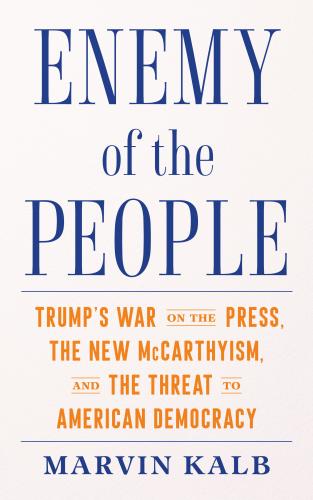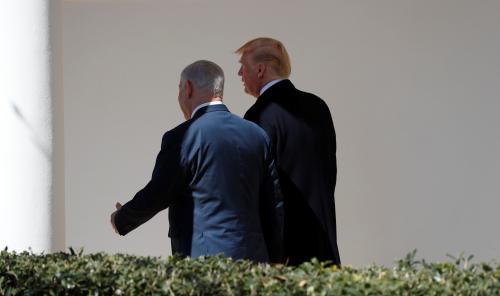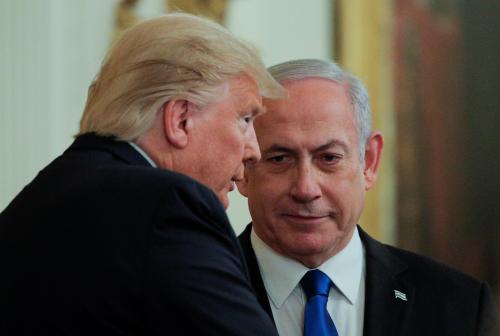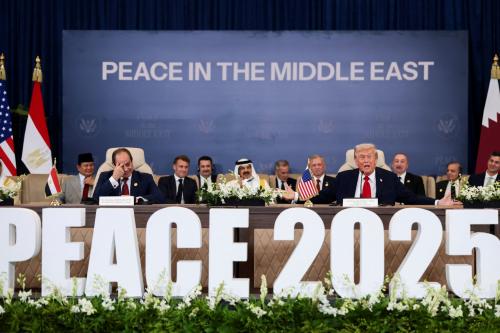As things are shaping up now, Israel and Trump will either rise or—disastrously for Israel—fall together, writes Shalom Lipner. This piece originally appeared in Politico.
On Monday, a U.S. secretary of state—the hawkish Mike Pompeo—basically adopted the Israeli prime minister’s stance toward Iran, highlighting its malign influence in the Middle East and ordering up a tall list of demands that the Islamic Republic is certain to reject. This came after President Donald Trump pulled the United States out of the nuclear deal with Tehran, calling it “defective at its core.”
And last week, Jerusalem was festooned with the Stars and Stripes as the U.S. embassy relocated to Israel’s American-recognized capital—another longtime Netanyahu goal. Even after dozens of Palestinians were killed when IDF soldiers mobilized to prevent their surge across the Gaza border, the United States backed Israel to the hilt, blaming Hamas for the violence and adding a dramatic walkout at the reviled United Nations for good measure.
All of this helps explain why Trump is more popular in Israel—a recent poll puts his approval rating there at 59 percent among Israeli Jews—than he is in the United States. Still, as the celebrations wind down in Jerusalem, I can’t help wondering how everyone will feel when the hangover wears off. The truth is that Netanyahu’s embrace of Trump is extremely risky for Israel—and eventually, my country is bound to pay a severe price.
One would be hard-pressed to find an Israeli, a friend of Israel, or even a Bible-believer who doubts that Jerusalem is the capital of the Jewish state. To them, Trump’s recognition of the city’s status is simply an affirmation of fact. Guatemala and Paraguay have already followed in his footsteps. With all these countries now seeing the light, as it were, Israelis feel vindicated.
But the Trump presidency is a unique animal. Netanyahu has compared Trump to Harry Truman, the president who conferred historic American acceptance of Israel’s independence in 1948. The comparison is flawed.
Truman, who ascended to the office unwittingly when Franklin Roosevelt died three months into his fourth term, presided over a different America. For all his shortcomings, Truman still managed to rally and win his own personal mandate to govern in the 1948 general election.
Trump, on the other hand, remains a divisive figure in American politics. His Electoral College victory in 2016 stood in sharp contrast to his loss of the popular ballot by almost 3 million votes. Charges of Russian interference in the campaign continue to cast a shadow over the legitimacy of his leadership. And his “colorful” language horrifies many. Under these circumstances, much of what he does becomes instantly the subject of controversy.
American support for Israel has been losing its bipartisan luster over the past few years. Bitter clashes of policy and personality between Netanyahu and Trump’s predecessor, Barack Obama, injected toxic animosity into the alliance between their countries. Netanyahu has since found a kindred spirit in Trump, but for enemies of Trump, any friend of the current administration is equally suspect.
The current predicament presents a dilemma for Israel. The prevailing mood in the country these days is triumphant. Netanyahu enjoys an open door in the White House and the Kremlin, where he even marched alongside President Vladimir Putin in the Victory Day parade. Israel’s military and intelligence services are scoring unparalleled achievements in defense of the country. While Arab leaders line up to engage with Israel, universal disgust over anti-Semitic smears uttered by Palestinian leader Mahmoud Abbas has virtually erased pressure to negotiate with him.
A good part of this windfall owes to Trump’s embrace of Israel and the cover he affords its government. His decision to exit the nuclear deal with Iran and the embassy move were top items on Netanyahu’s wish list. Israel is now pressing on its other priorities—such as extending the full-court press on Iran beyond the nuclear sphere—in hopes of taking advantage of this window of opportunity.
But Netanyahu should be careful. Bounty that comes with partisan strings is always at risk of being yanked when power inevitably changes hands.
When Israel is the beneficiary of Trump’s largesse—motivated either by Trump’s own political calculus or Israel’s interest—it positions itself smack in the middle of America’s ideological debate. If Trump’s replacement follows his lead and repudiates the legacy of his predecessor, Israel could then suffer the consequences. And with most American Jews opposed to Trump, Israel may not be able to count on their spirited advocacy, either. The recent kerfuffle involving Natalie Portman’s pullout from a prestigious awards ceremony in Jerusalem caught many Israelis by surprise.
Trump is also liable to leave Israel holding the short end of the stick. After extolling the opening of the new embassy in Jerusalem, Israel retains only limited latitude to resist any less palatable measures that Trump may have in store. These might include territorial withdrawals in Jerusalem to support Trump’s peace plan—which could compromise the stability of Netanyahu’s coalition—or a U.S. retreat from Syria that could leave Israel more dependent on Russian caprices.
Israel should think long and hard about the wisdom of jeopardizing robust, enduring, and bipartisan American support for short-term gains that have been mostly rhetorical and symbolic. To be sure, many of these moves are understandably gratifying to a majority of Israelis. Iran is a sworn enemy. And moving the U.S. embassy to Jerusalem was befitting of the friendship between America and Israel. But it can’t be detached from its fraught context. No Democrats joined the congressional delegation to the dedication ceremony.
Trump is being hailed in Israel as a hero. Late last year, its transport minister announced that he would name a future Western Wall train station after Trump. And just last Sunday, one of the country’s premier soccer clubs changed its name to “Beitar Trump Jerusalem.” As things are shaping up now, Israel and Trump will either rise or—disastrously for Israel—fall together.
The Brookings Institution is committed to quality, independence, and impact.
We are supported by a diverse array of funders. In line with our values and policies, each Brookings publication represents the sole views of its author(s).











Commentary
Netanyahu’s risky romance with Trump
May 22, 2018